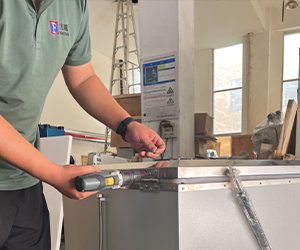Cable Repeated Bending Test Machine Producer for Quality and Durability Assessment
Understanding the Importance of Cable Repeated Bending Test Machines
In today’s fast-paced technological environment, ensuring the durability and reliability of cables is paramount. Cable manufacturers are continually looking for ways to improve the quality of their products, and one key method for achieving this is through rigorous testing. Among the various tests available, the cable repeated bending test machine stands out as an essential tool for evaluating the performance of cables under stress.
A cable repeated bending test machine is specifically designed to simulate the conditions that cables might face during normal use. This machine subjects cables to repetitive bending cycles that replicate real-world scenarios, such as frequent flexing and twisting. The importance of this testing is underscored by the fact that cables are often subjected to bending during installation and throughout their operational life. Therefore, understanding how a cable reacts to repeated bending is critical for manufacturers seeking to enhance the longevity and functionality of their products.
One of the primary reasons manufacturers invest in cable repeated bending test machines is the ability to identify weaknesses in cable design. By subjecting cables to extreme bending conditions, manufacturers can observe and record behavior such as insulation wear, conductor breakage, and overall structural integrity. This information empowers engineers to make necessary design alterations to improve performance, ultimately leading to higher quality cables that can withstand rigorous usage.
cable repeated bending test machine manufacturer

When selecting a manufacturer for cable repeated bending test machines, several factors should be considered. First and foremost, the machine should feature advanced technology that allows for precise control over bending angles, speeds, and cycles. This level of control ensures that the testing environment closely mimics real-world situations, which is crucial for accurate results. Additionally, a reliable manufacturer will provide comprehensive support, including setup, maintenance, and calibration services, ensuring that the machine operates effectively over time.
Moreover, an effective cable repeated bending test machine should come equipped with data analysis capabilities. The ability to track and analyze performance metrics in real-time enables manufacturers to make informed decisions based on empirical data. This analytical aspect is indispensable, as it facilitates continuous improvement in cable design and production processes.
In conclusion, cable repeated bending test machines play a vital role in the cable manufacturing industry by ensuring that products are tested for durability and reliability. By utilizing these machines, manufacturers can not only enhance product quality but also build trust with their customers by delivering consistently high-performing cables. With the advancement of technology and increasing demands on cable performance, investing in robust testing solutions like the cable repeated bending test machine is more important than ever. This commitment to quality assurance will ultimately lead to safer, more reliable cables that meet the needs of an ever-evolving market.
-
Why the Conductor Resistance Constant Temperature Measurement Machine Redefines Precision
NewsJun.20,2025
-
Reliable Testing Starts Here: Why the High Insulation Resistance Measuring Instrument Is a Must-Have
NewsJun.20,2025
-
Flexible Cable Flexing Test Equipment: The Precision Standard for Cable Durability and Performance Testing
NewsJun.20,2025
-
Digital Measurement Projector: Precision Visualization for Modern Manufacturing
NewsJun.20,2025
-
Computer Control Electronic Tensile Tester: Precision and Power for the Modern Metal Industry
NewsJun.20,2025
-
Cable Spark Tester: Your Ultimate Insulation Assurance for Wire and Cable Testing
NewsJun.20,2025
 Copyright © 2025 Hebei Fangyuan Instrument & Equipment Co.,Ltd. All Rights Reserved. Sitemap | Privacy Policy
Copyright © 2025 Hebei Fangyuan Instrument & Equipment Co.,Ltd. All Rights Reserved. Sitemap | Privacy Policy
